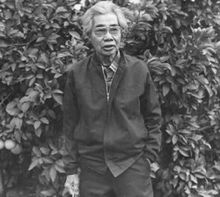“Leadership is incidental to the movement,” he argues. “You don’t have a (Martin Luther) King if you don’t have years of oppression of black people. You don’t have a Gandhi if the British Empire was fair in ruling India.” –Phillip Vera Cruz
Phillip Vera Cruz was one of the thousands Pilipino men that left the Philippines during the 1920s to purse better jobs and living conditions. Filipino men The working conditions, racial discrimination, and minimal wages pushed the Filipinos to rise up against the injustices being committed. These migrant worked all up the west coast from aspsragus (California) to salmon canning (Alaska). Cruz rose out the masses as one of the leaders in this fight for Filipino farm workers, a life-long fight. Phillip Vera Cruz is a significant activist in Asian-American as well as US History because he not only led the laborers’ rights movement for both Filipinos but also challenged the foundation of said movement.
Cruz was one of the foundational leaders in the movement for workers’ rights in California. As an Asian-American that was constantly marginalized through discriminatory policy and laws such as anti-masogony law, exclusionary laws, and propaganda of yellow peril. Cruz stood his ground by taking stand for the rights of his fellow Filipinos. He started off with fighting for rights within his own union “Agricultural Workers Organizing Committee” that was mostly Filipino, they brought about a lot of change in the 1950’s for labor struggles. They later on joined other unions to form the United Farm Workers Organizing Committee with Cesar Chavez. Cruz helped as a leader within the UFW to teach other members the skills and experiences that he had gained over 30 years of fighting. In 1965, Philip Vera Cruz led 1,500 Filipino workers on strike. Later on Filipino and Mexican leader joined forces to create the UFW.
Whilst Philip Vera Cruz was a frontrunner in this crusade, he also took a critical look at the base of this group and how it disadvantaged the Filipino workers. Cruz criticized the UFW for its treatment of ranking, lack of support for Filipino workers, and dominance of Mexican workers. After the success of the UFW with being recognized as a union by the Delano growers many of the original Filipino workers who had fought from the beginning did not get what they were promised. Cruz fought for the recognition of Filipinos as native workers rather than migrant workers who weren’t protected under the UFW. Since the UFW did not protect the Filipino laborers against the continued discrimination by employers there was still a lot to be done. Philip Vera Cruz stood up to the hypocritical tendencies of his peers specifically Cesar Chavez, his courage to challenge the ways in which organizers and activists work. Cruz also recognized the difference between the Mexican tactics for protest (non-violence) in comparison to the Filipino tactics (violence). One of the main reasons why the Filipino worker’s faded to the background of this movement was due to that simple differentiation in tactics of protest.
Creative Piece: http://dl.flipagram.com/mnnh/KCO9QypJMw
Works Cited
Garcia, Matthew. “Labor, Migration, and Social Justice in the Age of the Grape Boycott.” Gastronomica 7, no. 3 (2007): 68-74.
04, A. (1992). ‘A Duty to Fight’ : Labor: Nearly 30 years ago, Philip Vera Cruz helped start what became the UFW. His struggle represents a forgotten chapter in the history of Filipino farm workers. Retrieved September 01, 2016, from http://articles.latimes.com/1992-08-04/news/vw-4986_1_vera-cruz/2
Rojas, B. L. (2016). The forgotten history of the Filipino laborers who worked with Cesar Chavez. Retrieved September 02, 2016, from
